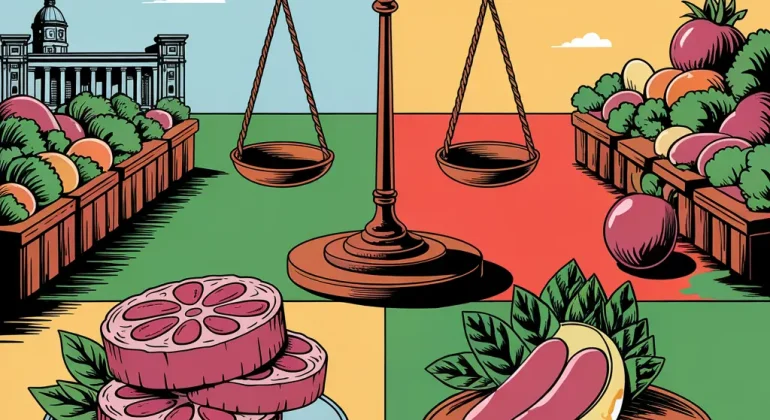On 28 January 2025, the French Council of State (Conseil d’État) issued two landmark decisions (n° 465835 and n° 492839), overturning the decrees (n° 2022-947 et n° 2024-144) banning the use of the terms “soy steaks” and “veggie sausages”. This decision is in line with the position of the European Court of Justice (ECJ), which had previously ruled on the issue. This ruling has significant implications for the food industry, particularly in relation to the labelling of plant-based products. It also reflects a wider legal debate about the use of traditional food terminology in the context of rapidly growing plant-based alternatives.
Sommaire
Background to the case
The legal framework of the ban
The French government initially banned terms such as “soy steaks” and “vegetable sausages”, arguing that such terms could mislead consumers into thinking that these products were made from meat. However, companies in the plant-based sector challenged this regulation, arguing that it unfairly restricted their ability to accurately market their products. The legal question arose as to whether these French decrees violated broader European principles of competition and the free market. This led to the Council of State’s decision to overturn the ban.
The role of European law
The Council of State’s decision follows an important ruling by the European Court of Justice in October 2024. The ECJ had emphasised that such bans could violate the freedom of companies to advertise their products, as long as the products were clearly labelled as plant-based and not derived from animals. This position was crucial to the Council of State’s assessment, which concluded that the French decrees did not comply with European principles of free movement of goods and commercial freedom.
The legal reasoning behind the repeal
The impact of the ECJ ruling
The Council of State’s decisions of 28 January 2025 followed the logic of the ECJ ruling and concluded that the French regulations banning terms such as “soy steaks” and “vegetable sausages” were overly restrictive. The Council of State stated that these terms could be used as long as there was a clear indication that the products were plant-based. This decision aims to provide greater freedom for producers while ensuring transparency for consumers.
Consumer protection versus corporate freedom
The Council of State balanced the need for consumer protection with the commercial freedom of companies. It concluded that the use of terms such as “steaks” or “sausages” would not confuse consumers, provided that the labelling clearly indicates that these products are plant-based. This approach seeks to strike a fair balance between preventing consumer confusion and allowing plant-based businesses the freedom to market their products effectively.
Impact on the plant-based food industry
Greater flexibility for manufacturers
With the ban lifted, manufacturers of plant-based products can now freely use terms such as “soy steaks” and “veggie sausages”. This decision improves their ability to market their products and supports the continued growth of the plant-based foods sector, which is expanding rapidly in France and Europe. It allows producers to label their products in a way that appeals to consumers, while maintaining the accuracy of their claims.
Impact on consumer behaviour
Consumers will benefit significantly from this decision as it will ensure clearer product labelling. This decision helps to reduce confusion about the nature of plant-based foods and increases the credibility of plant-based claims. As more people adopt vegetarian and vegan diets, the decision ensures that the marketing of these products remains transparent and in line with the values and expectations of environmentally conscious consumers.
Conclusion
The Council of State’s overturning of the ban on terms such as “soy steaks” and “veggie sausages” is a significant victory for the plant-based food industry. By aligning itself with the position of the ECJ, this decision allows companies greater freedom to market their products while maintaining transparency for consumers. It highlights the importance of balancing consumer protection, business innovation and market freedom in an evolving food landscape.
Dreyfus Law Firm works with clients in the food sector, providing specialist advice on intellectual property and regulatory issues to ensure compliance with national and European laws.
We collaborate with a global network of intellectual property attorneys.
Join us on social media !
FAQ
1. What is the Council of State?
The Council of State is the highest administrative court in France, responsible for ensuring that government decisions comply with French law. It advises the government on legal matters and rules on disputes involving public administration.
2. Why did France ban terms such as "soy steaks" and "vegetable sausages"?
France introduced the ban to avoid consumer confusion, as it believed that such terms could mislead consumers into thinking that these products were made from meat.
3. What impact has the ECJ ruling had on food labelling in Europe?
The ECJ ruling emphasised that plant-based products can use familiar food terminology as long as the label clearly indicates that they are plant-based, promoting marketing freedom while protecting consumers.

